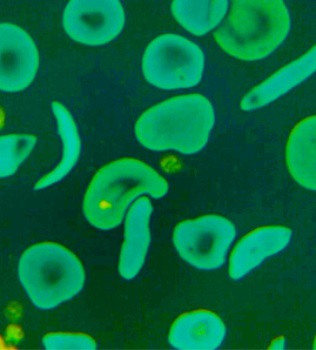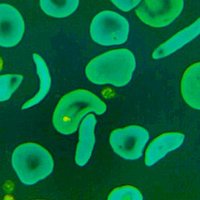Treatment of non-malignant blood diseases
The physicians and scientists at KiTZ have many years of experience in the treatment of non-malignant blood disorders such as anemias (often referred to as "anemia"), coagulation disorders, and blood disorders resulting from immunodeficiencies.
Anemias are the best-known non-malignant blood diseases. They are characterized by a reduction in the red blood pigment "hemoglobin", i.e. they affect the red blood cells (erythrocytes). Due to the increasing number of migrants from the Mediterranean region and the Near and Middle East, hereditary diseases of the erythrocytes, such as sickle cell disease or thalassemia, which are common there, are gaining in importance. Patients with anemia can find help at KiTZ - contact us!
Research on rare anemias
At KiTZ, several research groups are involved in the treatment and study of non-malignant blood disorders. In general, these diseases occur in fewer than 2,000 people in Germany.
Disorders of the coagulation system can lead to reduced hemostasis (tendency to bleed) or to excessive coagulation (increased risk of thrombosis). For the competent and appropriate care of children with coagulation disorders, in addition to the necessary experience, a professional infrastructure is required which is available around the clock.
We treat children and adolescents with congenital and acquired disorders of blood coagulation (e.g., hemophilia, von Willebrand-Jürgens syndrome, platelet dysfunction) in interdisciplinary collaboration.
If we find unusual coagulation values in a patient, we immediately get to the bottom of them. Sometimes multiple blood tests or so-called stimulation tests are necessary to identify the cause of the coagulation disorder. Many patients come to us because they have been found to have abnormal blood coagulation values prior to an operation. We clarify this, contact the surgeons and take care of all necessary safety measures in connection with the upcoming surgery.
We are happy to advise external colleagues on the correct procedure for dealing with the coagulation disorder.
Center for the treatment of hemophilic children and adolescents
Our department is a regional center for the treatment of hemophilic children and adolescents. Specialists are available around the clock to provide advice. In the context of all other clinics and institutes of Heidelberg University Hospital, we have all diagnostic and therapeutic possibilities at our disposal. Thanks to the long-standing good cooperation with the Hemophilia Center for Adults at the SRH Kurpfalzkrankenhaus Heidelberg, seamless care is possible upon entry into adulthood.
Immunodeficiencies refer to diseases in which the functions of the immune system are impaired from birth due to a genetic defect.
In order to be able to diagnose blood disorders as quickly as possible, the Center for Pediatrics and Adolescent Medicine has set up a pediatric hematology laboratory that pools information to enable faster diagnoses.
In order to better meet the needs of children, adolescents and young adults with hemoglobin diseases, the doctors of the KiTZ founded the thalassemia and sickle cell center Rhein-Neckar together with colleagues of the University Medical Center Mannheim (UMM).
Contact:
Prof. Dr. Joachim Kunz
Tel.: +49 6221 – 564002
E-mail: joachim.kunz(at)med.uni-heidelberg.de
KiTZ is the world’s first center to treat a form of the transfusion-dependent β-thalassemia (TDT) with gene therapy. Treatment with the drug Zynteglo is approved by the European Medicine Agency (EMA) for
- Patients with TDT from 12 years of age, in whom the mutations of the ß-globin gene allow a certain residual activity of the ß-globin chain synthesis (no β0 / β0 genotype) and who are suitable for a hematopoietic stem cell (HSC) transplantation, but for whom no Human Leukocyte Antigen (HLA) compatible, related HSC donor is available.
The transfusion-dependent ß-thalassemia is an enormous burden for affected patients and families. In addition to health restrictions due to the disease itself, patients need blood transfusions every three to four weeks as a lifelong therapy. In addition, treatment is required to excrete excess iron, which otherwise critically threatens the function of the heart, liver and hormone-producing tissues. This disease therefore reduces life expectancy and leads to a considerable burden on the quality of life of the patient and the affected family.
With the new therapy, the affected patients have for the first time the chance to live a life independent of transfusions. The treatment takes place in the Clinic for Pediatric Oncology, Hematology and Immunology of the Heidelberg University Hospital. The contact person is Professor Dr. Andreas Kulozik, Medical Director of the Heidelberg University Clinic and Director of the KiTZ clinical program.
Consultation „Transfusion-dependent Thalassemia“
Prof. Dr. Andreas Kulozik
Tel.: +49 6221 – 56 4500
E-mail: andreas.kulozik(at)med.uni-heidelberg.de
Prof. Dr. Joachim Kunz
Tel.: +49 6221 564002
E-mail: joachim.kunz(at)med.uni-heidelberg.de
Prof Dr. Andreas Kulozik
Tel.: +49 6221 564500
E-mail: andreas.kulozik(at)kitz-heidelberg.de
PD Dr. med. Johann Greil
Tel.: +49 6221 564002 or 565054
E-mail: johann.greil(at)kitz-heidelberg.de


